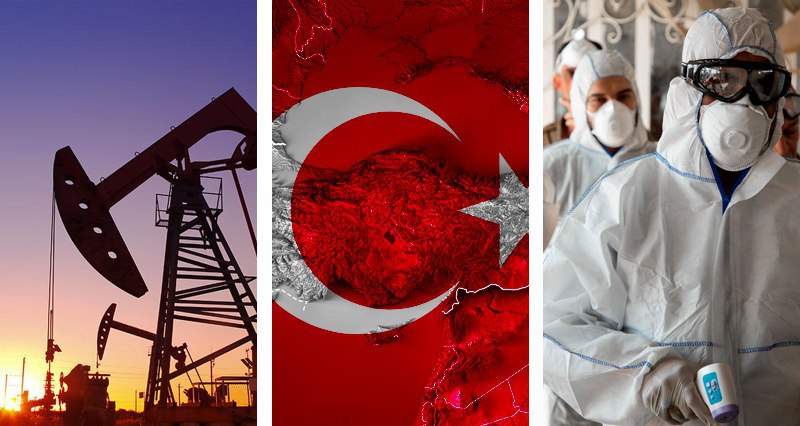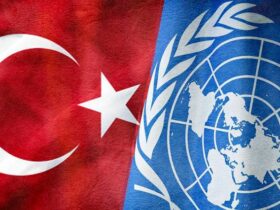Coronavirus
By the end of the week, the number of confirmed coronavirus cases in the world was almost 1,700.00 while deaths have exceeded 106,138.
The European region (with over 880,000 cases) remains the record holder, followed by the American regions (over 573,000).
The largest number of infected in the USA is more than 492.00 cases (according to official statistics alone, according to the University of Hopkins, more than half a million), followed by Spain, Italy, Germany and France.
For the first time in US history, an emergency regime has been extended to all states.
The introduction of an emergency regime in the US allows for easier access to government funding at the federal and local levels.
????With @realDonaldTrump’s declaration for WY, the President has now declared for the 1st time in history that a major disaster exist within all 50 states at once. The President continues to respond to the needs of every Governor to protect the health of all Americans. ???????? #COVID19
— Judd Deere 45 Archived (@JuddPDeere45) April 11, 2020
As we explained earlier, the US response to the pandemic was too slow and reluctant as a result of potential economic losses. Nonetheless, the pandemic has resulted in mass death and a huge strain on the budget.
https://uwidata.com/9502-american-pandemic-the-true-face-of-totalitarianism/
In addition, the pandemic has revealed internal structural problems of the United States: not only health care, but also inequality, and even racism. The data show that black Americans die from COVID-19 in greater proportions than all other races. African Americans are disproportionately affected due to social and racial inequality in the United States.
https://uwidata.com/9749-coronavirus-outbreak-exposes-depths-of-racism-in-us/
It is becoming increasingly clear that the United States can no longer continue its domination of the world geopolitical sphere. The United States can no longer even help itself, let alone others. It has, however, managed to do its best to maintain its reign of terror against its geopolitical enemies despite the pandemic.
https://uwidata.com/9548-covid-19-and-the-end-of-the-washington-consensus/
The era of social and economic crisis is coming, with the threat now coming from outside rather than inside, as countries struggle with unemployment and economic imbalances. There is no doubt that each country will face serious domestic challenges until a new economic system is put in place.
The Washington Consensus is under serious threat from the pandemic crisis.
The World Health Organization (WHO) “lacks information” about the risks of re-infection with coronavirus and the time frame for persistence of the infection in the body. The organization issued a statement following a report by South Korean medical officials who claimed to have repeated positive tests on patients with COVID-19 who had previously had a negative result.
https://uwidata.com/9654-the-new-world-order-after-the-coronavirus/
Oil negotiations
Turbulent oil negotiations took place throughout the week.
The OPEC+ countries agreed on Friday night to cut oil production by 9.7m barrels per day in May-June. At the same time, the production restriction will last until May 2022, but in a smaller volume. According to the plan of OPEC+, each of the 23 participating countries should reduce production by 23% from the level of October 2018. The exceptions are Russia and Saudi Arabia, which will equally reduce production from 11 mn barrels a day to 8.5 mn barrels a day. The final conclusion of the deal was hindered by Mexico, which refused to reduce production by 400 mn barrels a day, and agreed only to 100 mn barrels.
US President Donald Trump intervened in the negotiations and agreed to cut production by 250,000 barrels per day in the US to make up for Mexico’s position.
Due to the new cuts, the oil-producing countries expect to achieve a sharp increase in oil prices. Negotiations were conducted remotely via teleconference against the backdrop of the coronavirus pandemic.
In general, sooner or later the oil war will end, but it will cause great damage to both sides and the world economy. Cheap oil will not be in demand in the retreating economy. In general, the oil price war is only partially beneficial to oil-importing countries, but it is bad for the world as it will slow down the world economy and cause a deep and prolonged recession.
https://uwidata.com/8823-saudis-set-fire-to-the-oil-markets-can-they-put-it-out/
As we wrote earlier, the only positive factor for the world economy may be China. If China’s economy, which recovered from the shock of January’s coronavirus outbreak, begins to gain momentum in the second quarter of the year, it will bring a sense of optimism and help repair oil damage. The decisive factor will be to eliminate the coronavirus threat. Other factors contributing to the growth of the world economy include ending the trade war between the US and China and reaching a new trade agreement between the UK, EU and US.
Turkish Ministry of Interior
Turkish Interior Minister Suleyman Soylu resigned after being criticized for introducing a 48-hour curfew in the country, the politician wrote on Twitter.
The curfew was declared starting April 11 in 30 cities and throughout the province of Zonguldak as a measure to combat the spread of coronavirus, with residents banned from leaving their homes at night. The restriction was extended to Ankara, Istanbul and Antalya, as well as other cities.
Residents only learned of the curfew a few hours before the measure took effect, as a result, there were long queues at grocery stores full of unprepared citizens . Soyla was also criticized for increasing the risk of infection.
However, Turkish President Recep Tayyip Erdogan has not accepted his resignation, the administration says.
https://uwidata.com/9888-last-week-in-turkey-debates-about-the-curfew-and-the-signal-for-a-new-economic-model/

















Leave a Reply